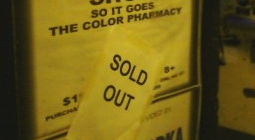Thanks in no small part to the global reach of digital distribution, more and more independent musicians are finding themselves with opportunities to gig well beyond the borders of their home countries. Whether you’re driving north from the east coast of the United States to play a coffee shop in Montreal, bringing your electro-pop act to a string of clubs in Tokyo and Thailand, or presenting a midnight set at a jazz festival in Germany, performing music gigs abroad can be an incredibly rewarding and cool experience — but one that brings its own set of challenges.
Here are tips from seasoned musical world travelers to help you make your international music gigs run as smooth as possible.
Cover the basics
Many of the steps you’d take to have a good international vacation or business trip are the same steps that will help you have a smooth multi-country gigging experience. In other words, preparation is key.
Common-sense basics include checking with your doctor to make sure that you have proper immunizations and medications for the region(s) you’ll be visiting; printing and copying all vital documents like passports and travel reservations; researching your destinations so you’re aware of any political or public safety issues; checking with your banks and credit card companies about currency exchanges and overseas transaction fees; finding out what (if any) local food or water you should avoid; and so on.
While there are many resources out there for advice on international travel, Lonely Planet is a personal favorite and a great place to start.
Keep the current and connectivity in mind
When it comes to packing, the first thing that Dream Theater keyboardist Jordan Rudess recommends is bringing versatile power adapters. “Maybe even have duplicates,” he says. “You don’t want to be in a hotel room and not be able to plug anything in. Having the right cables and adapters is a big concern when traveling in Europe, or anywhere.”
The same advice applies for instruments and amps. “My pedal board is custom made and my power supply works with 110 and 220 volts,” says guitarist Alex Prol. “Make sure you know what type of current runs in the countries you’re visiting, and what plugs you need, and make sure that your gear is going to work.” Your local music retailer should be able to help you find the right sort of power convertor, though custom power supplies or modifications can be helpful as well. “They’re more expensive, but you get exactly what you want,” he says.
Internet connections are also important when gigging internationally, especially if you want to stay connected to loved ones across an ocean, or keep your social media presence up to date. “Make sure your Skype account, or other video chatting capabilities, are up to snuff, and that your video camera is working,” says Rudess. “If you get back to your hotel room after a gig and try to connect to your family but they can’t see you, they won’t be happy. It’s best to trouble-shoot video connections before going out the door.”
If possible, check in with the places you’ll be staying ahead of time to find out what sorts of Internet options, if any, are available. Similarly, if you plan to upload any content from a mobile device using international cellular networks, make sure to check with your local carrier about roaming costs. Using data services abroad can be ridiculously expensive, so know what you’re getting yourself into before you Tweet.
Pack practically
If you’re performing music gigs in major cities around the world, chances are you’ll be able to find a replacement high-hat clutch or a new patch cable relatively easily — but if your tour takes you even slightly off the beaten path, having replacement gear in hand has the potential to save you lots of headaches.
For guitarists, Prol recommends bringing extra cables and string sets and a small tool kit, so you can fix your own axe on the fly if something goes amiss. “If you’re bringing your own amp, always bring an extra set of valves,” he adds. “They break easily, especially if you take them out of an amp before you pack it up for travel, so have at least one extra kit ready.”
For keyboardists, composers, or producers, Rudess recommends bringing a portable rig so you can keep your chops up on long journeys. “You can always throw a Korg Nano keyboard into your suitcase,” he says. “It plugs easily into your computer or iPad and you can use it in conjunction with software synthesizers. There’s no excuse for not having something to practice on!”
One final packing tip from Rudess: “Have all of the details of your travel with you in hand — where you’re staying, where your gig is, how you’re getting to the hotel, who your contact people are. If we’re playing in a country where we know the promoter and he meets us at the airport, great. But if you arrive at an airport somewhere in Asia, nobody’s there to meet you, and you have no idea where you’re staying, that’s not fun.”
Build in a buffer
When you’re traveling internationally, make sure to build in a lot of extra time to get from point A to point B, advises saxophonist Jon Irabagon. “You never know when your first train might be just a few minutes late,” he says. “If you have a rough travel day where you have to catch two or three transfers, those few minutes will make a difference.”
Showing up to a gig late — in a country where you may not speak the language — can be a stressful thing to deal with, so plan ahead to avoid the situation altogether.
Insure your gear
Anything can happen on a plane, train, or crowded club dressing room, so if you’re traveling with valuable gear, it’s best to be prepared for the worst. Should a beer end up splashed across your prize analog synth or your custom-built bass suddenly vanish into thin air, a solid insurance plan can help you recoup your losses.
Irabagon insures his horn with a musical instrument insurance company called Clarion, though he points out that there are other companies that provide coverage for comparable costs. When you’re shopping for instrument insurance, be sure to get quotes from a number of different services, check online reviews, and ask your musical friends and colleagues for recommendations; a call to your local Grammy chapter couldn’t hurt either. Regardless of which company you go with, make sure that you explicitly know what your fees are and what level of coverage is offered for international travel.
“Insurance can be kind of tricky, but if you’re traveling with an artist who has tour support, sometimes they take care of your insurance,” says Prol. “Some of them don’t, though, so you need to ask.” The guitarist recalls one instance when he was touring with a major artist and one of his instruments was stolen after a show. “It was only then that I found out that they weren’t taking care of insurance for musicians,” he says. “Now I make sure to ask about everything up front.”
Approach illicit substances with caution
We’ll keep this one short: Even if you only have a tiny amount of marijuana and like to light up and wind down after a show, best practice is to leave it at home — or face the risk of potentially intense consequences. Many countries do not look kindly on foreigners with narcotics, drug-sniffing airport dogs are skilled at what they do, and punishments can be harsh — here’s a story about one touring musician who ended up in Japanese prison for precisely this reason — so if you do choose to engage, proceed at your own risk.
Stay comfortable
Keeping yourself relaxed and rested while traveling internationally can go a long way towards ensuring that you’ll put on a strong show. To that end, make sure to eat as well as you can, sleep as much as you can, get some exercise, and pack things that will keep you comfortable.
“I never know what the neighborhood around a hotel is going to be like, and if it will be safe to go out and get exercise, so I always pack stretchy exercise bands, just in case,” says Rudess. “You can also bring air freshener for hotel rooms that may not smell so nice, and even your own pillows, if you’re sensitive.” Rudess further recommends packing a good set of headphones for the hotel room; if he’s going on a long tour, he’ll also bring a small, portable audio system to put on hotel room desks and chill pre- or post-gig.
Make friends
“Remember to be respectful of promoters and local musicians, or volunteers and crew that you meet on your travels,” advises Irabagon. “You never know when you will run into them again and if they can help you in random ways.”
Rudess echoes the point: “If you want to have experiences in a different country during your time off, it’s best to befriend the promoter that you’re working with ahead of time and ask for advice. Often a promoter can arrange something ahead of time, or hook you up with a local guide. Don’t just Tweet out something like, ‘I’m in Jakarta! Who wants to take me around?’ That can be troublesome. In many cases, people who are inviting you to perform are happy to have you there and might really enjoy showing you around before the gig.”
Stay focused and maintain perspective
No matter how beautiful or fascinating your international musical locale may be, remember why you’re there in the first place. “You’re not on vacation,” says Prol. “People sometimes forget about that and start acting like they’re rock stars. We are rock stars through the eyes of our audiences, but you have to know that you’re working. If there are nice beaches, that can be easy to forget,” he continues, laughing, “but you can’t oversleep, you can’t be late for sound check, and you have to be on top of your game. If you’re not, you probably won’t be on the next tour.”
On the flipside, staying professional doesn’t mean you can’t dive into the local culture and enjoy every minute of your time abroad. “Have fun!” says Irabagon, who advises that touring musicians ask around to find good local spots for food and drink. “It’s an honor and privilege to get to travel and play creative music for people in different parts of the world.”
Via Discmakers





